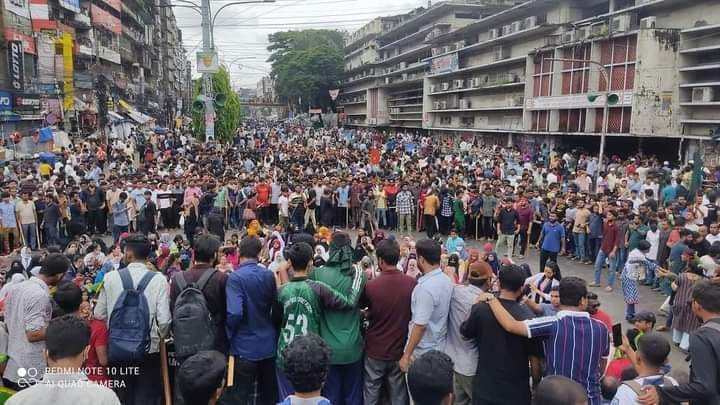In a dramatic turn of events, Sheikh Hasina, the Prime Minister of Bangladesh, resigned from her position and fled the country with her sister, Sheikh Rehana, amidst escalating civil unrest. The events unfolded rapidly, marking a significant moment in Bangladesh’s history.
Historic Departure
On August 15, 1975, Bangabandhu Sheikh Mujibur Rahman, the founding father of Bangladesh and Sheikh Hasina’s father, was assassinated along with most of his family at his residence in Dhanmondi, Dhaka. Almost 49 years later, the history of turmoil seems to have repeated itself as Sheikh Hasina, alongside her sister, departed from the official residence of the Prime Minister, Ganabhaban, under intense pressure and threat to their safety.

The Escape
Sheikh Hasina and Sheikh Rehana escaped Ganabhaban around 2 PM on August 5, 2024. Reports indicate that they were transported by an army helicopter to an air base in Dhaka, from where they boarded a Bangladesh Air Force cargo plane. The plane reportedly landed at the Indian Air Force base in Hindon, Ghaziabad, around 6 PM. There is uncertainty regarding whether Sheikh Hasina will seek political asylum in India or another country. Sources have revealed that her request for asylum in Britain remains unanswered.
Statements from the Family
Sheikh Hasina’s son, Sajeeb Wazed Joy, in an interview with the BBC, confirmed his mother’s resignation and departure from politics. Joy expressed his mother’s deep disappointment with the current state of Bangladesh, stating, “Mother was thinking of resigning since Sunday night. At the request of her family, she left the country for her own safety.” He added, “Her politics ends here. We have enough education and resources to support ourselves. After all her hard work, a small section protested against her, which deeply disheartened her.”
Political and Social Upheaval
Sheikh Hasina’s departure comes in the wake of significant unrest stemming from the controversial student quota reform movement. In 2018, Hasina’s government abolished all quotas in government jobs, including the freedom fighter quota, sparking outrage. On July 11, 2024, the High Court reinstated the quota system, leading to widespread student protests that soon morphed into a mass movement.
Despite the Supreme Court later overturning the High Court’s decision, the damage was done. The student-led protests escalated into violent confrontations with the police, resulting in approximately 300 deaths between July 18 and July 26. Efforts by Hasina’s administration to quell the unrest, including army deployment and curfews, failed to restore order.
The Final Hours
On August 5, amidst the mounting chaos and with the military’s support waning, Sheikh Hasina was given a 45-minute ultimatum by the army to resign. She requested to address the nation but was denied by the army chief. Thousands of people stormed Ganabhaban shortly after her departure, ransacking the residence.

Legacy and Future
Sheikh Hasina, who has been a central figure in Bangladesh’s politics, leaves behind a mixed legacy. Her tenure saw significant economic growth and development, earning Bangladesh the moniker “Rising Tiger of Asia.” However, her departure underscores the volatile nature of Bangladeshi politics and the deep-seated issues that continue to challenge the nation.
As the situation in Bangladesh remains fluid, the future of the country and its leadership hangs in the balance. The international community watches closely, hoping for a peaceful resolution and stability for the people of Bangladesh.





